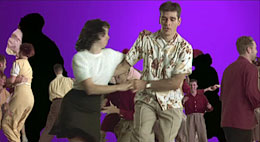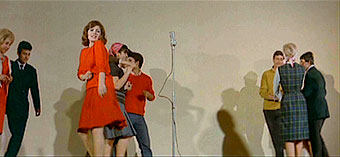|
|
Thread: Very opening scene... falling into the pillow. - (Gonk) Related: Related Theory: Fate & Reincarnation |
|
Lynch's Clue #1
Pay particular attention in the beginning of the film: at least two clues are revealed before the credits.
In the jitterbug scene we see many images. There are the four different pairs of dancers getting their groove on (notice the red hair of one of the dancers?), three contrasting layers of image (the blue screen, the dancers, and the images of the enlarged dancers in the shadows), and immediately this is followed by Diane (or is it Betty) with the old couple.
Betty is shown bathed in the spotlight as the scene fades into her bedroom. We see images of dancing pairs while Diane, aside from the two old people, is seen without a partner. Irene and her male companion are apparently a manifestation of Diane's good/innocent side.
-
In order of appearance, the credits list Betty well before Diane. This means that the partner-less jitterbugger we see is Betty. This fact is supported by someone shouting "Betty, Betty" off-screen right before the scene fades into Diane's bedroom. Does this mean that Diane is spinning a yarn when she tells us that she won a jitterbug contest? Or was the contest real, but just represented to us differently than how it happened?
-
Though people still jitterbug today, those are clearly supposed to be people from back in the day. Everyone is wearing vintage clothes. At present day nostalgia type sock hop most people would be wearing current clothing and maybe a few would be wearing contemporary versions of typical jitterbug attire. Are we supposed to believe this is all a throwback to the good old 50s or before (the time when Aunt Ruth was young) and not a jitterbug contest that Betty/Diane was at?
-
The dance contest had been a stepping stone for Diane to move to Hollywood and pursue an acting career. We hear again of it at Adam's dinner party.
A True Memory
The opening scene of Mulholland Dr. is the psychedelic dancing of the Jitterbug contest. The dance sequence is a mixture of images that are full of energy and that have a powerful impact. We are clearly supposed to be impressed with the quality of the dancing, and so when it ends with Diane being the winner, we can imagine how much she felt like a star at one point in her life. I believe this is a true memory of Diane's although it is somewhat jumbled because I think that her mind is being affected by some type of drug she has just been taking.
Some have argued that it is not likely to have been a scene from reality because we don't see her dance partner, but I think that couldn't be farther from the truth. She's remembering what was important to her from that time of her life, and her dance partner wasn't very important to her. What was important is that she beat all of those other great dancers, and that her grandmother and grandfather were there to celebrate the occasion with her. In fact, it is extremely important to her that they seem to be proud and happy for her, because as we find out at the end of the movie, she is incredibly afraid of them. But she is not afraid of them during this happy moment of her life. Everything is perfect. Her face is shown shining in the lights as images of herself and her grandparents become superimposed on the scene of the dancing. We can see in her eyes that at this point she believes in herself, and she believes that her star can shine even outside of Deep River, Ontario.
However, it is important to note that all of the images of her grandparents that show up in this scene quickly get fuzzy and unsteady. And I believe this suggests that there is something unclear and unstable about her relationship to them that keeps getting in the way of this perfect picture. In fact, I believe that this is a clue that she is having trouble dealing with the memory of her grandparents and is in fact repressing some truth about them. She wants to remember them as smiling and supportive of her during this important moment in her life, but she is having trouble doing just that. Therefore, the smiles on everyone's faces are masking some deeper issues. - (Alan Shaw)
A Wish Dream
If you watch the jitterbug scene, first of all you notice that the people dancing are wearing muted colors and they are wearing old time clothes as jitterbug contestants would. It's sometimes argued that this took place in the past. But given the age of Diane, there's no way that she is old enough for this to have taken place in her past. When you look at the costumes the people are wearing, they are not wearing the kinds of costumes that I would see on people in present day or even ten years ago doing a jitterbug. They are not wearing the revival style. You know, any time you get into this revival thing people wear this kind of the flashiest version of their clothing, not most subdued, most conservative...I mean there are women in all brown dresses and the same with the men. And it appears to me to be a flashback to an actual jitterbug contest that would have taken place in the proper era.
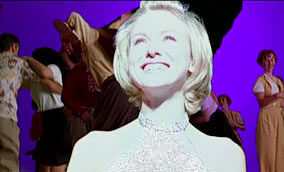 At that time when you
see Diane come forward in kind of this overlay you'll notice that she is wearing
an outfit that is completely out of place with everything everybody else is
wearing in that scene. I'd almost bet there are sequence on her dress. Her hair,
her attire, none of it is indicative of or remotely like the other
"contestants". Now I don't
have an answer to this, but I don't see how this sexy seductress outfit she is
wearing when she wins the jitterbug contest fits in with this supposed jitterbug
contest she is in. On top of that we are shown this scene of the jitterbug contest and she is never
in it. So why would someone reflect back on a jitterbug contest about themselves
and never put themselves in the picture? Assuming the film makes sense I don't
understand exactly how that plays in with "being truthful". I think
this is just one more thing in kind of a dream or maybe it gives Diane an excuse
to start the story for coming to Los Angeles. - (Michael
Geoghegan)
At that time when you
see Diane come forward in kind of this overlay you'll notice that she is wearing
an outfit that is completely out of place with everything everybody else is
wearing in that scene. I'd almost bet there are sequence on her dress. Her hair,
her attire, none of it is indicative of or remotely like the other
"contestants". Now I don't
have an answer to this, but I don't see how this sexy seductress outfit she is
wearing when she wins the jitterbug contest fits in with this supposed jitterbug
contest she is in. On top of that we are shown this scene of the jitterbug contest and she is never
in it. So why would someone reflect back on a jitterbug contest about themselves
and never put themselves in the picture? Assuming the film makes sense I don't
understand exactly how that plays in with "being truthful". I think
this is just one more thing in kind of a dream or maybe it gives Diane an excuse
to start the story for coming to Los Angeles. - (Michael
Geoghegan)
A Lie
There never was any jitterbug contest. Diane may not even be from Ontario, but a native of Hollywood for all we really know - there is more reason to disbelieve whatever she tells us than to believe it. Diane is a desperate person, trying very hard to escape her own reality, and in so doing, gets in over her head, and places herself in the awkward position of having to tell an obvious lie about who she is at a dinner party. I think the real chronology of events in this film begins with that dinner party, and that lie. People seem to believe that Coco's pity-laden response to the explanation is based on her perception of the explanation as pathetic. It is, of course, unrealistic to believe that because you won a jitterbug contest in diddlyville USA you can make it as an actress in Hollywood. I believe Coco's response goes deeper.
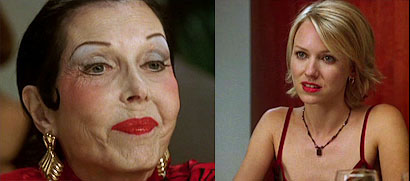 Coco knows that Diane is simply another desperate soul looking to escape her circumstances in life, ad that the whole Ontario/Jitterbug contest is a cover
- one that won't fly with the likes of an experienced old actress like Coco. The humiliating pat on the hand, and the pitiful, "I see, dear," from Coco is what finally sends this desperate soul over the edge.
Diane knows her story doesn't fly anymore. She's simply made it to a place in the Hollywood scene where people aren't going to buy in to her desperate lies. She's gone as far as she's going to go, and it wasn't very far. It's hopeless, she knows it, and all her hopes of escaping her reality were hinged on lying to these people, who, as it turns out, will not be fooled.
Coco knows that Diane is simply another desperate soul looking to escape her circumstances in life, ad that the whole Ontario/Jitterbug contest is a cover
- one that won't fly with the likes of an experienced old actress like Coco. The humiliating pat on the hand, and the pitiful, "I see, dear," from Coco is what finally sends this desperate soul over the edge.
Diane knows her story doesn't fly anymore. She's simply made it to a place in the Hollywood scene where people aren't going to buy in to her desperate lies. She's gone as far as she's going to go, and it wasn't very far. It's hopeless, she knows it, and all her hopes of escaping her reality were hinged on lying to these people, who, as it turns out, will not be fooled.
What follows (though what follows actually takes place in the opening scene), is a downward spiral into desperate fantasy where her lies cannot be denied, because, in this world, they are the truth. Everything here works as she had hoped, because here it is all true. In this way, she can live the life she wished were her own before the walls outside of her fantasy come crashing down on her. The film is the last desperate attempt of a human being trying to find some fulfillment in her life before her life is over. - (SlyyDaugg)
There's no way that Diane was in a jitterbug contest. It just doesn't make any sense. I also think that the jitterbug contest, as well as all the 50's references, are stories that have been told so many times to her by Aunt Ruth, that they've been ingrained into her subconscious, and she's incorporated them now as her own. - (Aerial)
An Escape Mechanism
MD is about Diane, who was sexually abused as a child by her grandmothers male companion. Her grandmother was aware of the abuse but remained silent as did Diane. Like many abused children, Diane had a place in her mind that she escaped to as "Betty" while the abuse was taking place. This jitterbug place had loud fast music and lots of body motions, and included her grandmother and companion as loving caregivers. Elements that would mask and counteract the horror that was really happening to her. When Diane was grown she also used this escape when she had sex with men. She had to tune herself out, and escape as Betty to her special place because it reminded her of the abuse she suffered. This is exactly what is happening in the opening scene in MD known as the jitterbug scene. - (richdubbya)
This is not the first time that Diane has dreamed she is Betty. This is probably a recurring dream, waking and asleep, that she cannot rid herself of. This alter-ego is probably beginning to take over as the dominant personality. Diane is schizophrenic, possibly bi-polar too. Whatever, she is seriously damaged mentally, by both the actual occurrences in her life and the creation of Betty. So, the 'jitterbug contest' is the catalyst for Diane's move to L.A. And it did lead to acting, ya know, wanting to act. - (blu-riven)
Dancing = Acting?
"I won a
jitterbug contest and that sort of led to acting... you know... wanting to act".
What kind of statement is that? There is no link at all between the contest and acting.
Firstly, do we have any indications that Diane is a dancer? Does she move well? Does her posture indicate dance training? Secondly, if Diane is not a dancer, do we see anyone else who might fit the bill?
The link between dance and acting is a tenuous one at the moment, here at the start of a new century. However, this was much more commonplace in Hollywood in the early 20th Century. Although we now often see the transformation of models into actresses, in the inter-war and post-war years there were a great many dancers who became actors, especially when musicals were at their height. Again, this suggests that Diane's story might best be linked to an older woman, like Aunt Ruth or (better still) Coco. After all,
Ann Miller who plays Coco was an identifiable dancer in many musicals from the post-war period.
- (Rochas)
There is something anachronistic about a jitterbug contest in the age of rap. But then again, the dial phones in "Twin Peaks" were relics of a different age too. I think Lynch likes to play with images we might associate with a different era. Then again, there are reasons that Diane's jitterbug contest fits her particular story:
-
She is from a small town in Canada. Just as the town of Twin Peaks might be a bit slower to abandon old ways (dial phones), the impression I get of Diane's home town is of the polar opposite of glamorous and cell-phony Hollywood. A jitterbug contest in such a tiny burg might not be such an oddity.
-
There was a big revival of swing music and dancing in the mid-nineties (the movie "Swingers" captured that nicely). Although such music has again fallen out of favor, a small town might be behind the times enough to still go for big-band dancing.
-
A lot of people have commented that Lynch's jitterbug sequence is like a GAP commercial on acid. Those swing-dance spots were still running up to a few years ago. That might indicate that there are still (hidden? demonic?) enclaves of swing dancers out there.
-
Correct me if I'm wrong (that's one thing I can count on) but I believe Diane's contest win didn't send her directly to Hollywood. It was the win that inspired her to choose a career as a performer, after which she chose to move to Hollywood. - (bluejay)
Dancers as souls in the underworld
Most people forget about the opening of Mulholland Dr. because it does not seem to fit with the rest of the film. It elevates itself from the remaining soundtrack by assertively frisky dance music (Jitterbug). We watch dancing couples superimposed on a magenta, impermeable background. Some of the dancers become transparent and disappear. Out of a sudden, we see a bright silhouette that soon snaps into focus: Betty wins her jitterbug contest in Deep River Ontario and emerges with the old couple at L.A. airport. This scene is of particular interest, because it is actually Diane of the second part who won this contest. Still, this scene plays out before right before the woman descents into the pillow. Going with the dream interpretation – of all pieces, it is this one that firmly belongs to Diane's background and yet doesn't become a part of her dream, but precedes it. And of all pieces, it is this one that looks most unreal, and of all scenes, it is this one that does not produce Diane, but Betty. (Note that the credits list the character as Betty and not as Diane.)
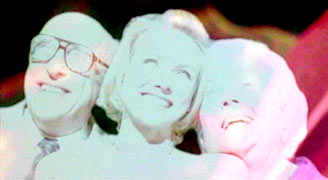 The jitterbug scene marks a stage before the protagonists step into the dream world of Hollywood.
And most notably, this phase of pre-entering the story seems vague and unreal. The reason for this prestage to be placed ahead of the entire film is, that it is meant for all protagonists. I
see those dancers as souls in the underworld. The latter is kept in magenta, somewhat similar to the blue box that forms its entrance. Before entering a body, those souls do not have a concept of life. They dance away
without rhyme or reason. When a role needs to be cast, they get picked up by soul guides in shape of two
elderly. This time it is Diane to be called into living, but it could also have been Betty or anyone else standing in
line.
The jitterbug scene marks a stage before the protagonists step into the dream world of Hollywood.
And most notably, this phase of pre-entering the story seems vague and unreal. The reason for this prestage to be placed ahead of the entire film is, that it is meant for all protagonists. I
see those dancers as souls in the underworld. The latter is kept in magenta, somewhat similar to the blue box that forms its entrance. Before entering a body, those souls do not have a concept of life. They dance away
without rhyme or reason. When a role needs to be cast, they get picked up by soul guides in shape of two
elderly. This time it is Diane to be called into living, but it could also have been Betty or anyone else standing in
line.
The idea of reincarnation, and that is what it is probably called, is based on the assumption, that no soul emerges and no soul is going to waste. Even if you do not subscribe to this, admittedly, daring interpretation of the opening scene, to my mind it is rather obvious, that there is only a limited number of 'dramatic persona' allowed to act on the story's surface. And if we further assume the Lynchian color blue to be a leitmotif, then Club Silencio, the box, the key and this odd opening scene cohere. On all accounts, the box seems to function as a gateway between acts. - (Frank Wittchow)
Related Theory: Fate & Reincarnation
Similarities between the jitterbug scene and Betty's arrival at LAX - (vicster111)
-
We see the color purple.
-
We see doubles of people.
-
There is a redhead amongst the 'chaos'.
-
Betty emerges from the chaos, brought 'front and center', flanked by Irene and her companion.
-
Betty sparkles.
-
Irene and her companion appear to have great admiration (maybe even love) for Betty.
-
Once Betty is chosen as the 'favorite', Irene and her companion then leave Betty to stand on her own.
John Neff (MD sound designer) on the recording of the "Jitterbug" soundtrack
"The Jitterbug contest music was the last thing we recorded in Prague during the scoring sessions for Mulholland Drive, in December of 2000. I had made a beatmap of the music piece David had cut the scene to, because either the rights to use that piece were too expensive or it was not available at all. So the musicians had to 'jam' to an existing beat track, and one of them made a comment just as the track started. It is embedded, and David kind of liked it. The language is Czech. Interestingly, the horns were overdubbed and David did not like them at their proper pitch, so I lowered them one octave. That's why they sound so haunting. David and I sort of composed the part back in Hollywood from various parts that were not recorded at the same time, which is why we put an "Arranged By" credit on the track."
Trivia
|
|
|
Scene from "Contempt" |
The jitterbug scene in MD is a subtle reference to The Wizard of Oz, in which there is a famous jitterbug scene in the Enchanted Forest that was originally shot but later cut out.
»'Wizard of Oz' references-
The dancing before the opening also recalls Hitchcock's opening for Shadow of a Doubt, which Blue Velvet references likewise.
-
Contempt features a rehearsal scene reminiscent of to the jitterbug scene with stage dancers casting intersecting shadows. »Contempt references
-
Due to an acquaintance of mine who worked at ABC at the time of the 'Mulholland Dr.' miniseries pilot, it has come to my understanding that Lynch had shot a short sequence for the TV show that was to open each episode (a credit sequence) which is virtually identical to the Jitterbug blue screen opening of the feature film, except for one fascinating difference: the dance & music is The Charleston, not the Jitterbug. "Are you sure?" I asked my friend. "Positive", he said, "I have wondered why he changed that for the movie since I saw it." - (Gus Mahler)
